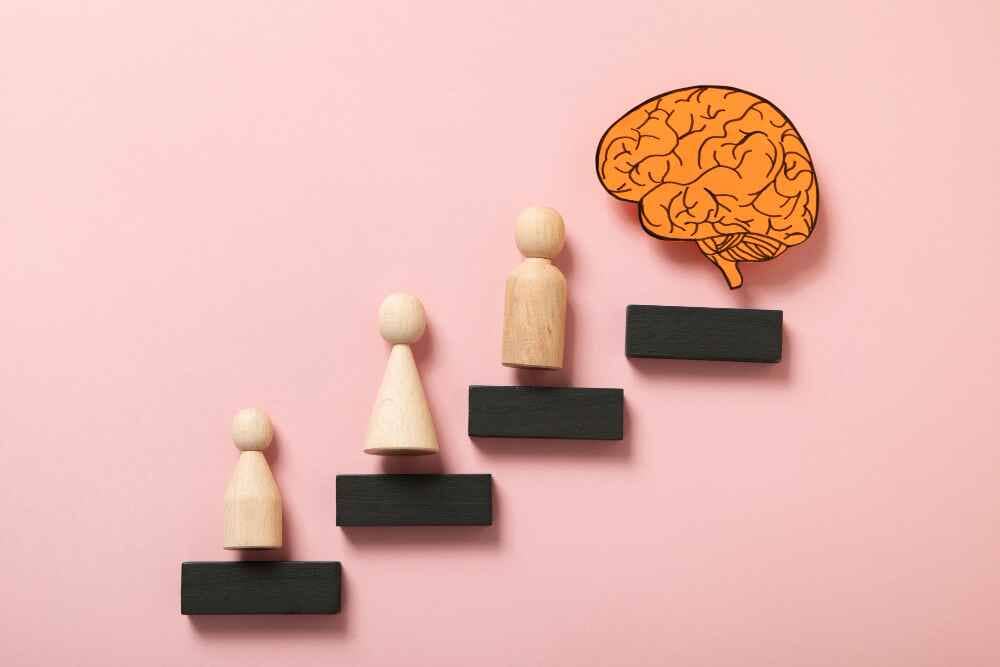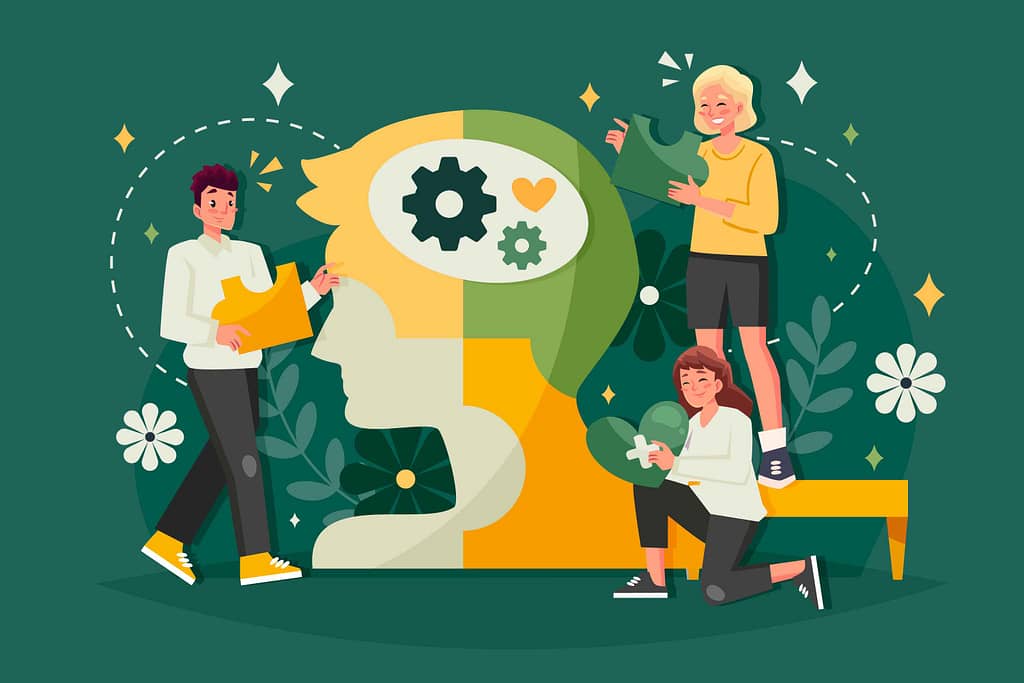Understanding Developmental Psychology
Ever wondered why some kids seem to learn faster than others? Or why we act the way we do as adults? That’s the essence of developmental psychology – the study of how we grow and change throughout life.
In this article, we’ll dive into developmental psychology. We’ll explore how people develop physically, mentally, and emotionally. But is understanding it tough? Let’s find out together.
Definition and Scope of Developmental Psychology:
Developmental psychology is all about understanding how we grow and change from birth to old age. It’s like a roadmap of our lives, showing how we develop physically, mentally, and emotionally over time.
This field covers a wide range of areas, or domains, of development:
– Physical Development: This includes changes in our bodies, like growing taller, gaining muscle, and developing motor skills.
– Cognitive Development: Here, we look at how our thinking, learning, and problem-solving abilities evolve as we age.
– Emotional Development: This domain explores how our feelings, like happiness, sadness, and anger, develop and how we learn to manage them.
– Social Development: Social development is about how we interact with others, make friends, and understand social norms.
Together, these domains paint a picture of our growth and maturation as human beings. Developmental psychology helps us understand the journey from infancy to adulthood and beyond.

Complexity of Human Development:
Understanding how people grow and change isn’t simple. It’s a mix of many things and keeps evolving over time.
– Multifaceted Process: Human development involves many different aspects, like how we think, feel, and interact with others. It’s not just one thing – it’s a combination of everything happening in our lives.
– Influencing Factors: Many things affect our development. Our genes, the environment we grow up in, our culture, and even our own experiences all play a part in shaping who we become.
– Examples: Take a child’s personality, for instance. It’s not just about their genes. It’s also about the environment they’re raised in – their family, school, and friends. A child with a genetic predisposition to shyness might become outgoing if they’re raised in a supportive and encouraging environment.
Human development is like a puzzle with lots of pieces. Understanding it means looking at all the different factors that come into play.
Challenges in Understanding Developmental Psychology:
While developmental psychology is fascinating, it can also be tricky to wrap your head around because it’s so complex.
– Complexity: Human development involves many factors and isn’t always straightforward. It’s like trying to solve a puzzle with lots of pieces that keep changing.
– Common Misconceptions: One big challenge is oversimplifying things. Some people think development follows a straight path, but it’s more like a winding road with lots of twists and turns. Also, individual differences play a huge role. What works for one person might not work for another.
– Importance of Diverse Perspectives: To truly understand human development, it’s essential to consider different viewpoints. That means looking at things from the perspectives of psychologists, educators, sociologists, and more. It’s like putting together a puzzle with pieces from different sets.
By embracing the complexity of human development and considering diverse perspectives, we can get a better understanding of how people grow and change over time.
Strategies for Overcoming Challenges:
Understanding developmental psychology may seem tough, but here are some simple tips to help:
– Stay Curious: Approach the subject with an open mind and a sense of curiosity. Be willing to explore different ideas.
– Keep Learning: Read textbooks, take online courses, and explore research articles to keep learning about human development.
– Look at Different Views: Don’t just focus on psychology alone. Consider insights from other fields like education and sociology.
– Apply What You Learn: Try to use what you learn in real life. Observing people around you can help you understand development better.
– Talk About It: Join discussion groups or social media communities to share ideas and learn from others.
– Reflect: Take time to think about what you’ve learned and how it applies to different situations.
– Ask for Help: Don’t be afraid to ask questions or seek guidance from professors or mentors.
Remember, understanding developmental psychology is a journey. Keep exploring and learning along the way!
Case Studies or Examples:
Let’s look at some real-life stories to understand developmental psychology better:
1. Language Development: Meet Sarah, a three-year-old who struggles to speak in full sentences. With early speech therapy, Sarah learns to communicate better. This shows how early intervention helps kids develop language skills.
2. Attachment Theory: Imagine Alex, a baby who feels secure with his mom. He explores his surroundings confidently because he knows his mom is there for him. This illustrates how strong bonds with caregivers shape emotional growth.
3. Cognitive Development: In a classroom, students learn about conservation by pouring water from one glass to another. They realize that even if the appearance changes, the amount of water stays the same. This shows how hands-on activities help kids understand concepts better.
4. Parenting Styles: Think of a family where parents are warm, supportive, and set clear rules. Their kids tend to have higher self-esteem and do better in school. This highlights how parenting styles influence a child’s behavior and development.
Above examples show how developmental psychology theories apply to real-life situations, guiding practices in education, parenting, and beyond. Understanding these concepts helps us support healthy growth and development in children.
Conclusion:
Understanding how humans grow and change isn’t easy, but it’s important. Let’s recap what we’ve learned:
– Human Development is Complex: It’s like a puzzle with many pieces, influenced by genes, environment, and experiences.
– Challenges Exist: It can be tough to grasp due to its complexity and misconceptions.
– Tips for Understanding: Stay curious, keep learning, and consider different viewpoints.
Keep exploring developmental psychology—it helps us understand ourselves and others better. Now, here’s a question for you: How can understanding human development shape your interactions with others? Think about it and keep learning and growing!
FAQs about Developmental Psychology:
1. Is developmental psychology only about children?
No, developmental psychology covers the entire lifespan, from infancy to old age. It explores how people change physically, emotionally, socially, and mentally at different stages of life.
2. Why is understanding human behavior considered complex in developmental psychology?
Human behavior is intricate because it involves a range of emotions, social interactions, and cognitive processes. Developmental psychology aims to unravel these complexities to comprehend why people act the way they do.
3. What are the key milestones or stages in developmental psychology?
Developmental psychology identifies various life stages, including infancy, childhood, adolescence, adulthood, and old age. Each stage has distinct characteristics and challenges that individuals experience.
4. Are there specific theories that dominate developmental psychology?
Yes, there are several prominent theories, such as Piaget’s cognitive development and Erikson’s psychosocial stages. These theories provide frameworks for understanding how individuals grow and change over time.
5. How does research play a role in developmental psychology?
Research in developmental psychology involves both quantitative and qualitative methods. These methods help researchers study and analyze patterns of human development, contributing to a deeper understanding of the field.
6. Is it necessary to conduct experiments in developmental psychology?
While not mandatory, experiments are commonly used to study developmental theories hands-on. Engaging in experiments allows researchers and students to apply theoretical knowledge to real-world situations.
7. How can one make sense of the diverse perspectives in developmental psychology?
Understanding diverse perspectives in developmental psychology requires critical analysis and comparison of different theories. This process helps individuals develop a comprehensive view of how people grow and change.
8. Does developmental psychology have practical applications in the real world?
Absolutely. Developmental psychology is not just about theories; it also involves applying knowledge to real-life situations. Case studies, for example, help bridge the gap between theoretical understanding and practical scenarios.
9. Is it challenging to connect developmental psychology theories with real-life scenarios?
Applying theories to real-life situations can be challenging due to the dynamic nature of human development. However, this connection is crucial for gaining a deeper appreciation of how theoretical concepts play out in everyday life.
10. Who should explore developmental psychology, and why?
Anyone curious about human behavior and interested in understanding the complexities of growth and change should explore developmental psychology. It’s a rewarding field for those who enjoy learning and want to unravel the mysteries of the human mind across the lifespan.


